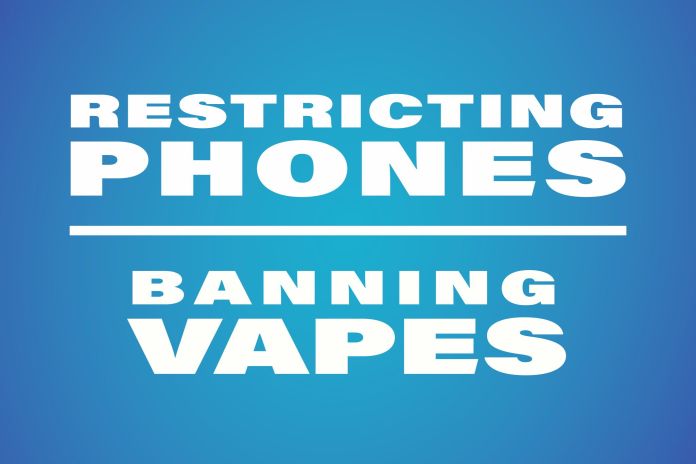NORTH YORK, Ontario – Ontario is introducing the most comprehensive plan in Canada to reduce distractions in classrooms and improve the health of children by standardizing and strengthening provincewide measures and mandatory learning to directly counter the alarming rise of vaping and cellphone distractions within classrooms.
As students benefit from three more years of uninterrupted learning as a result of the government’s historic signing of deals with all teachers’ unions, the government is taking further action to go back-to-basics by combating the negative impact mobile devices, social media and vaping are having on in-class learning.
“We have heard loud and clear from parents and teachers alike that cellphones in classrooms are distracting kids from learning,” said Stephen Lecce, minister of education.
“Our government is introducing the toughest policy in Canada to tackle this issue by cracking down on cellphone usage during class time, as well as banning vaping in all schools. When it comes to cellphones, our policy is ‘out of sight and out of mind,’ as we get students back to the basics by restoring focus, safety and common sense back in Ontario schools.”
Students in kindergarten to Grade 6 will be required to keep phones on silent and out of sight for the entire school day, unless explicitly permitted by an educator. For students in Grades 7 to 12, cellphones will not be permitted during class time unless explicitly directed by the educator. Moreover, social media websites will be removed from all school networks and devices, and report cards will include comment on students’ distraction levels in class. The government will provide mandatory training for teachers and new supports for students and parents.
The government is also strengthening the rules around students caught using or carrying vapes or cigarettes. Students will be required to surrender these products, along with parents being notified immediately of the situation. The government also officially announced $30 million in the 2024 budget to install vape detectors and other security upgrades in schools.
To support these initiatives, the government is investing $17.5 million in new wrap-around supports for student mental health and parent engagement. This will include:
- $15 million to provide supports for students at risk of addictive behaviours;
- $1 million to partner with School Mental Health Ontario to develop webinars and resources targeted to parents and students across the province to learn how to talk about the adverse effects of vaping and excessive cellphone usage;
- $1.5 million to Parent Involvement Committees and students to run local prevention campaigns to help deter vaping and cellphone distractions.
These changes and investments are part of the government’s plan to get students back to basics. By removing distractions in the classroom, students can focus on learning the skills they need to succeed after graduation.
Quick facts
- A 2023 UNESCO report found a negative link between excessive cellphone use and student academic performance and that students can take up to 20 minutes to refocus on what they were learning after focusing on a distraction.
- A CAMH study on youth, smartphones and social media use showed that over a third (35%) of Ontario’s secondary school students spend five hours or more daily on electronic devices (smartphones, tablets, laptops, computers, gaming consoles) in their free time.
- A 2022 Statistics Canada report found that vaping is more prevalent among younger rather than older Canadians, with more than one-fifth of adolescents aged 15 to 17 years reporting vaping in the previous 30 days.
- Ontario is the first province in Canada to have a provincewide social media ban on school networks and devices, and the new cellphone restrictions go further than any other jurisdiction in Canada.
- As part of an ongoing commitment to student mental health and well-being, for 2024-25, funding to support student mental health, including initiatives focused on student safety and physical activity, has reached $135.15 million, an increase of $117.76 million since 2017-18.
- In addition to explicitly banning e-cigarettes in schools and school-related settings, Ontario is responding to the popularity of vaping among students by:
- Investing $30 million over three years (2024-25 to 2026-27) to help equip schools with security cameras, lighting and other security upgrades, including vape detectors
- Strengthening existing mandatory learning on cannabis and vaping and digital citizenship, with emphasis on the elementary curriculum
- Providing $500,000 (2023-24) to the following community partners:
- Ontario Native Education Counselling Association for culturally relevant cannabis and vaping awareness and prevention initiatives for youth
- Canadian Lung Association for the “Lungs are for Life” program to raise awareness about tobacco, vaping and nicotine addiction
- Springboard for its “Weed Out the Risk” program to raise awareness among youth and young adults about the risks of driving or being in a vehicle with a driver who is under the influence of cannabis
- Lung Health Foundation to deliver the “Quash” program, which includes digital resources and a mobile app for students who are smoking and/or vaping.






